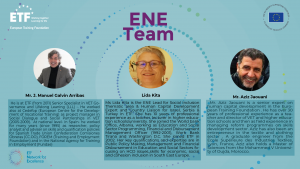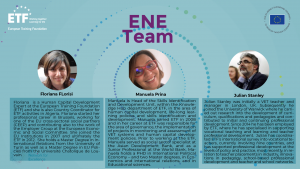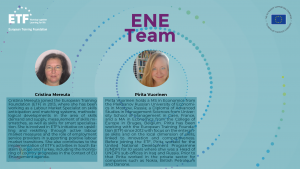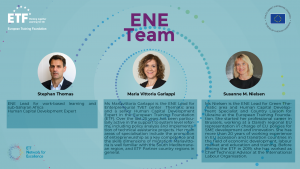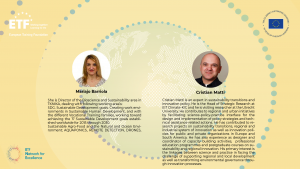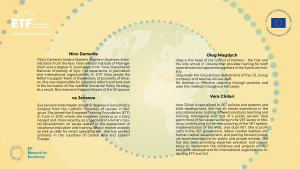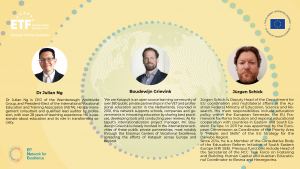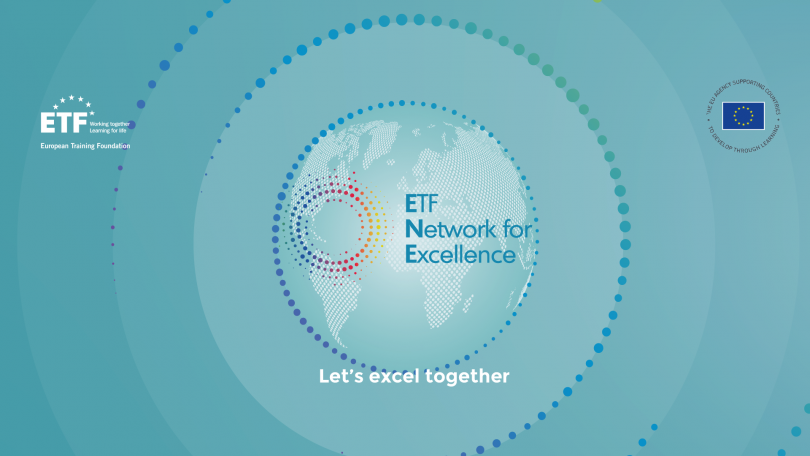
Excellence without borders: ENE Conference Day 2
The network - currently connecting 140 CoVEs in 25 countries, both within the EU and in ETF partner countries - will expand during a year in which a raft of new priorities have been identified during the conference.
Wrapping up the conference, Friday, the ETF's Manuela Prina, noted that during the conference 30 VET institutions had applied to join the network. She promised more events "to get to know each other" and - eventually as the Covid pandemic fades into history - physical conferences and events again.
The first day of the conference had concentrated on developments so far; Friday's focus was on where the network could develop in the coming year.
Four sessions looked at areas that CoVEs could concentrate on to increase their socio-economic impact, reduce inequality and improve ties with business and government.
Smart specialisation - an approach that looks to stimulate growth and improve competitiveness by finding and developing regional strengths - is an area that most VET Centres of Excellence should be working in.
"The skills base you have in your region affects your diversification today and tomorrow," Manuel Prina, chairing the session noted.
Human capital development is a key factor in smart specialisation and examples from regions working in sustainable health and tourism, energy efficiency and renewable energy resources, food processing, wood processing and furniture design pointed the way to synergies that could be found between different sectors to help build strong and responsive training systems in tandem with business and industry.
Oleg Magdach, founded a VET School of Painters in Ukraine when he and colleagues realised there were no existing institutions that suited the field.
"We want to work toward environmental awareness here and move to a point at which Ukrainian regions focus on knowledge intensive goods and services to help the country become self-sufficient on the world market and not just a raw material supplier. Smart specialisation is key to this process," he said.
Key EU priorities areas - Going Green, Entrepreneurship, and Social Inclusion - are also areas where CoVEs in the network will find support and partners, the conference heard.
In Tunisia, a new approach to embedding entrepreneurship within the VET system since major reforms in 2016 was driving this factor.
Mustapha Lakehal, of the Tunisian Agency of Education and Vocational Training, said: "We believe that performance relies on human capital and not on a set of structure. We talk about skills for individuals and then t ry to roll that out within an organization."
In Israel and Italy, two partnered CoVEs were taking similar approaches to social inclusion to achieve similarly promising results. In Israel students from both wealthy middle class neighbourhoods and poorer districts were benefiting from a student-centred approach at Tel Aviv's ORT Singalovski, where the focus was not solely on high scores, but on encouraging students to be involved in and passionate about the learning process.
In Italy, at the Cometa Formazione, where special needs students and others with various levels of vulnerability study, a student-centred approach was also driving programmes that took as their starting point the fact that "every student is unique, with unique talents."
The school sees itself as "part of a school eco system, where governance is not just school centred, but involves families and business partners to identify and create tools and practices that can be shared and discussed with other TVET centres in Europe and beyond," school principal Paolo Nardi said.
Working with wide networks and platforms will also help drive the work of the CoVE network: examples from around the world included that of the Netherlands' Katapult organisation, a network of 380 public private partnerships. When Katapult found that building insulation service programmes were suffering from a low take up because the job was perceived as "dirty" an information campaign emphasising how the work contributed to the wellbeing of - for example - theatregoers, increased student intake by 20% within a year.
Working with others was not only fun but useful: Zeynep Tereli, CEO of Turkey's Tink Technology and Humanity Colleges, noted: " Current research indicates that collaborative teaching methods increase student knowledge and vocational skills.
Did you like this article? If you would like to be notified when new content like this is published, subscribe to receive our email alerts.
